
Keir Starmer’s India Push is About Restoring Britain’s Credibility Post-Brexit
Starmer’s visit represents a joint effort to show how the UK & India can restore global credibility for each other.

advertisement
British Prime Minister Keir Starmer’s visit to India marks a turning point in the United Kingdom's foreign outlook, a moment when a Labour government re-engaged with India at a depth unseen for decades. More than a symbolic return to high diplomacy, it represents a strategic redirection: a government seeking to ground foreign policy in economic and technological pragmatism and geopolitical realism rather than political nostalgia.
Starmer’s decision to begin in Mumbai, not Delhi, underscored that shift, placing commerce before ceremony and partnership before protocol.
This visit comes amid mounting pressures on both, India and Britain. Post-Brexit Britain faces sluggish growth, strained public finances, and an electorate weary of austerity, while India navigates its own economic and diplomatic complexities in a volatile global climate. Global turbulence—from a resurgent Donald Trump in the United States to the deepening Gaza—Israel crisis, is testing the resilience and adaptability of both nations’ leadership.
India’s rise offers an opening for that recalibration. As an innovation powerhouse and manufacturing hub, India’s trajectory gives Britain a potential partner capable of helping it navigate the realities of a multipolar world. Starmer’s outreach serves both an external and internal purpose: strengthening a pragmatic partnership with a rising power while signalling to British voters that Labour can turn diplomacy into domestic opportunity.
Rewiring the UK–India Equation
Starmer’s maiden official visit as Prime Minister was designed to project seriousness of intent. In Mumbai, his participation at the Global Fintech Fest alongside Prime Minister Narendra Modi placed the partnership firmly in the future-facing domains of trade, technology, and education. Flanked by senior business leaders, university heads, and cultural figures, Starmer’s delegation represented an attempt to institutionalise cooperation beyond ceremonial goodwill.
Labour has claimed ownership of its conclusion, describing it as a framework for “mutual growth” that brings £1.3 billion in Indian investment to the UK and thousands of high-skilled jobs in climate technology, life sciences, and advanced manufacturing.
Equally forward-looking was the announcement of joint centres for Artificial Intelligence and Innovation, signalling direct investment in the industries that will define competitiveness in the 21st century.
Starmer’s India trip also reflected a social and political reset at home. His cabinet now includes an unprecedented number of Indian-origin figures such as Kanishka Narayan, Seema Malhotra, and Lisa Nandy. Their inclusion strengthens Labour’s claim to represent modern, multicultural Britain and gives weight to the idea that the party’s new foreign policy is rooted in representation rather than tokenism.
Beyond Moral Posturing
Equally significant was Starmer’s rhetorical restraint. He avoided the moralising tone that had defined Labour’s past dealings with India, particularly under Jeremy Corbyn.
By commending India’s Aadhaar digital identity system, long met with Western ambivalence, Starmer showed a willingness to value what works in practice rather than dismiss it in theory. In private talks with Infosys chairman Nandan Nilekani, he explored how Indian digital innovations might inform Britain’s own welfare and migration systems, reversing the traditional direction of policy learning.
The optics from New Delhi were equally notable. Lately, during the Conservative years, including the tenure of Indian-origin Prime Minister Rishi Sunak, no British prime minister made a formal state visit to India outside the G20 summit. Similarly, despite a strong ideological rapport and coordinated outreach between Tory leaders and the BJP, PM Modi himself refrained from visiting Britain except for the COP26 climate summit in Glasgow.
The decision to welcome Keir Starmer with full state honours and jointly unveil new strategic frameworks marks a deliberate recalibration on both sides. For India, engaging a Labour government now suggests confidence that London is moving beyond moral posturing—making clear that economic collaboration can proceed untethered from past political baggage.
Domestic Pressures and the Strategy of Engagement
Starmer’s India outreach also mirrors the complex balancing act his government faces domestically. While buoyed by a strong parliamentary majority, his administration must govern amid ongoing economic challenges and public expectations.
Inflation remains persistent, public services continue to feel pressure, and early signs show that the initial post-election optimism is evolving into a more measured, realistic assessment of the tasks ahead. Against this backdrop, the India visit offered a key moment, positioning Britain as still capable of shaping global partnerships that can deliver tangible benefits both internationally and back home.
The political calculus is equally sharp - Labour’s historical ambivalence toward India, particularly during Corbyn’s leadership, alienated many in the 1.8 million-strong British-Indian community. That disaffection translated into visible support for the Conservatives, who cultivated close ties with the BJP through diaspora networks such as the Overseas Friends of BJP (UK).
Beyond symbolism, the domestic dividends are real. Indian investment into Britain aligns with Labour’s core priorities: revitalising manufacturing, accelerating green jobs, and spreading economic opportunity beyond London. Technology partnerships also feed Starmer’s ambition to retool Britain’s workforce for a digital economy. In that sense, India is not just a foreign partner but an enabler of Labour’s domestic recovery agenda.
If sustained, this partnership could become a model for how middle powers navigate a fractured global order built on agility, reciprocity, and mutual respect. For Starmer, it is also a domestic project: using diplomacy as a lever for economic revival and national confidence. In an age tested by populism, protectionism, and conflict, the path from Mumbai may yet define how Britain rediscovers its place in the world, not as a nostalgic power but as a nimble one.
(Ashraf Nehal is a political and foreign policy analyst and a columnist primarily tracking South Asia. He can be reached on Twitter at @ashrafnehal19 and on Instagram at ___ashraf___19. This is an opinion piece. The views expressed above are the author’s own. The Quint neither endorses nor is responsible for them.)
- Access to all paywalled content on site
- Ad-free experience across The Quint
- Early previews of our Special Projects
Published: undefined